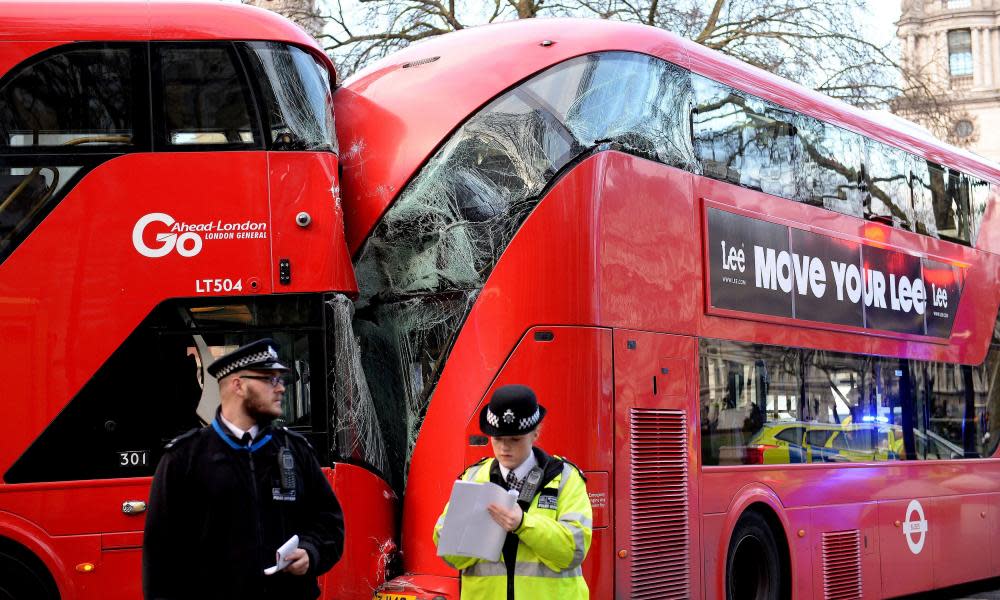My family was hit by a bus driver with road rage | Sarah Hope

My name is Sarah Hope. I am a wife and a mother to three children – Barnaby, 16, Sapphire, 14, and Pollyanna, who is 12.
Ten years ago, on 25 April 2007, my mother Elizabeth came to stay in our house in Mortlake, south London, to visit my twin sister, Victoria, who was in the Chelsea and Westminster hospital a few miles away after giving birth to a healthy baby boy two days earlier.
Imagine our excitement. The sun was high in a cloudless sky that day and I set off with my mother and Pollyanna in her buggy to the bus depot a few hundred yards from our front door. But as we crossed the bridge we could hear shouting and horns sounding. Pollyanna, who was two at the time, had only just learnedto walk. I carried the buggy over the bridge and she held my mother’s hand.
We crossed the road onto the pavement and I noticed a child’s lunch box on the ground. I bent down to pick it up and put it on a wall. As I turned around, the bus came – at lightning speed, too fast to scream. It just ploughed into the three of us on the pavement. There was a bang as loud as a bomb explosion. My legs were trapped under the bus and my head smacked against the wall. I slipped in and out of conciousness in a pool of blood.
I had suffered what is known as a severe degloving injury to my leg. I will be scarred for life. But that was nothing. My mother lost her life in that moment. Slumped next to me, she slipped away.
I could hear Pollyanna screaming. I could see her in the corner of my eye, about 20 feet away. She had been flung through the air. Her right leg was hanging off her knee by what looked like a thread. I could not help her. Her thigh appeared to have blown up like a balloon. She was taken in an ambulance to Chelsea and Westminster hospital and operated on for eight hours, as four surgeons tried to save her leg. But it was amputated later that day.
A year later, the bus driver was sent to prison for four years for one count of death by dangerous driving and two counts of grievous bodily harm. The court heard that the driver had become frustrated that he could not enter the depot.
Seven years later, after I appealed to the then-mayor of London, Boris Johnson, Transport for London and Metroline were forced to apologise. I told them that sorry had to mean sorry.
It has always worried me that a bus driver could have road rage. In February 2014, I began having meetings with TfL and discovered some shocking facts. I was told that transport bosses, who are often paid several times more than the prime minister and who get huge bonuses, do not even know the names of the victims hurt or killed in incidents on the London network. We are just insurance statistics.
I found there was little respect for drivers in charge of the 8,600 buses on London’s roads. They were often under great pressure not to be late. But the strain of being responsible for dozens of passengers and watching out for countless other drivers, pedestrians and cyclists was huge.
In July 2014, I made a film that went out to the 24,000 bus drivers in London as part of TfL’s new bus driver training. Simon Eccles, the surgeon who has treated my daughter and me for the past 10 years, also spoke on the film of the horrors of that day and the lasting damage that was done. The film is now being used to educate drivers at other bus companies across the country.
In February, I spoke to the London Assembly and uncovered more shocking facts. Different bus operators have different rules. For example, some drivers are not paid for their breaks. Driving a bus can be tiring, having to deal constantly with the public and never take your eyes off the road. Fatigue is an issue that must be dealt with.
TfL staff need to respect bus drivers more and listen to them. Their life is sedentary; they need to eat healthily, be encouraged to exercise and allowed to rest properly.
Exercise is vital for maintaining levels of serotonin in the brain which is thought to regulate anxiety, happiness and mood. Drivers need to be encouraged to exercise when they are having their breaks. I told the assembly members that drivers should be offered nutritional advice and exercise regimes, and be allowed to rest properly.
Road rage behind the wheel of a bus must never be excused or allowed. But TfL bosses need to recognise that every day, each bus driver is dealing with the public, which can be challenging. Keeping calm in the face of an angry passenger or road user is a fact of their job. I hope TfL will consider psychological training so bus drivers can learn methods to keep calm behind the wheel.
In April 2016, after two years of work, TfL launched the Sarah Hope Line, an incident support line to offer the public kindness, support and advice if they are severely injured, bereaved or witness a tragedy on the London transport network. I would now like that kindness and respect to be shown to the thousands of bus drivers, whom I hope will never have road rage again.
Sarah Hope is a safety campaigner and founder of the Sarah Hope Line and Elizabeth’s Legacy of Hope.
Sign up for your free Guardian Public Leaders newsletter with comment and sector views sent direct to you every Thursday. Follow us: @Guardianpublic

 Yahoo News
Yahoo News 
